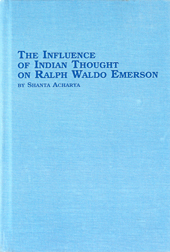The Influence of Indian Thought on Ralph Waldo Emerson

- Publisher
- The Edwin Mellen Press, USA (2001)
- ISBN Number
- 978-0773476295
- Price
- £30.00
- Purchase from shop
Between 1820, when Emerson started keeping his journal, and 1870, when Society and Solitude appeared, Indian thought played a number of complex roles in the articulation of the Emersonian self. Studies of Emerson’s Orientalism, caught up on the archaeological excavation of sources, failed to view his Indian interest from the broader perspective of the history of ideas. In tracing Emerson’s single great idea about the act of experiencing the world, this book establishes the relevance of Indian thought to the enactment of this process and the influence it had on his mode of expression.
Contents
- Chronology of Events in Ralph Waldo Emerson’s Life
- Foreword
- Preface
- Acknowledgements
- Introduction
- 1. Emerson’s Initiation to India
- The Eurocentric Vision
- Intellectual Dissent and Indian Thought
- 2. The Imperial Self: “Indian Superstition”
- 3. Emerson’s Indian Career: 1820-1845
- 4. Major Themes in Emerson
- Aspects of the Self
- A Theory of Illusion
- On the Problem of Evil
- Compensation
- 5. A Social Theory of Man
- A Man of Action
- The Complemental Man
- 6. “Brahma”: The Essential Man
- Notes
- Bibliography
- Index
Comments
Shanta Acharya explores the extent to which Indian thought was relevant to intellectual dissent in New England. In examining the major themes in Emerson’s writing – with reference to the Self, Illusion, Evil and Compensation – and the revaluations he was able to achieve in the conception of his ideas, and ultimately of his own self, Acharya is able to define for us the true measure of Emerson as a representative man, both for his own time and for all ages.
John O. Bayley, Thomas Warton Professor of English Literature, University of Oxford
... Acharya grounds her study in Western historical materialism, Romanticism, and revolutionary thought and in three thousand years of uninterrupted Sanskrit culture, ably showing how Emerson was attracted as much to the sensuality of Kalidasa’s poetry as to Vedantic philosophy ... Indian thought reaffirmed Emerson’s Transcendentalism and profoundly informed his quest for a truly representative man. How he succeeded – the ‘largesse of his vision’ – is what this lively, truly scholarly book is all about.
Franklin. D. Reeve
Reference
- ‘India and the World’ by Zofeen Maqsood